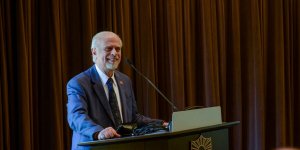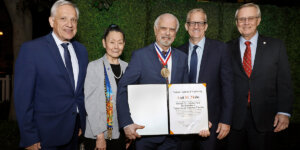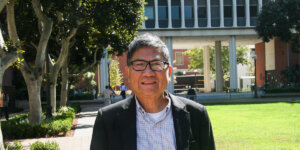
National Academy of Engineering 2021 inductees Azad Madni and Jong-Shi Pang.
The National Academy of Engineering announced today that Jong-Shi Pang, Epstein Family Chair and professor of industrial and systems engineering, and Azad Madni, professor of astronautical engineering and executive director of USC’s Systems Architecting and Engineering Program, have been inducted in the organization’s latest round of members.
Election to NAE membership is considered one of the highest professional honors for engineers. NAE members are elected by their peers and the honor is reserved for leading figures in business and academic management, technical positions, academia, and government and private engineering organizations.
The citation for Professor Madni reads: “For advances in low-cost simulation-based training using interdisciplinary model-based approaches.” The citation for Professor Pang reads: “For the development of methods to advance the theory and applications of optimization and operations research.”
Pang and Madni join 33 other USC Viterbi-affiliated faculty who have been afforded this honor and 5 in the last three years.
USC Viterbi Dean Yannis C. Yortsos said: “We are thrilled that our distinguished colleagues Azad Madni and Jong-Shi Pang have been elected to the National Academy of Engineering. This well-deserved honor reflects highly on their career accomplishments, their academic departments and colleagues and the school overall. We are very proud of them.”
Azad Madni
Madni is a pioneer in the field of transdisciplinary systems engineering. His research focuses on intelligent systems, distributed autonomy, formal and probabilistic methods and machine learning in complex systems modeling.
Madni began his career in Mumbai, India, where his dreams of space were bolstered by President Kennedy’s “we choose to go to the moon” speech in 1962. As a student at UCLA, he earned a bachelor’s and later a master’s degree in engineering. When he returned to UCLA to work on his doctorate degree, he was recruited by Rockwell International to work on NASA’s Space Shuttle Program, bringing to fruition his space aspirations.
As a lead engineer at Rockwell, Madni contributed to the design of the shuttle navigation system, including design of an innovative, probabilistic model-based approach to navigation system performance testing that produced significant cost savings for Rockwell in navigation system testing for the shuttle orbiter’s approach landing tests and orbital flight tests. For these important contributions, he received five Technology Utilization Awards from Rockwell and a NASA commendation.
Madni received his B.S., M.S. and Ph.D. from the University of California, Los Angeles (UCLA). In 1977, he was recruited by his advisor to head up the R&D group of Perceptronics, a UCLA startup. He led their R&D in AI and human-machine systems, game-based training simulators and distributed, virtual reality-enabled simulation-based training systems.
In 1994 he founded Intelligent Systems Technology, Inc., to conduct R&D in innovative uses of AI in complex systems engineering and interactive storytelling simulations for education and training. There he created award-winning products and was the recipient of U.S. Small Business Association’s National Tibbetts Award for California. He went on to win Developer of the Year from the Software Council of Southern California in 2000 and 2004.
In 2009, he joined USC and in 2009, became the founding director of the Systems Architecting and Engineering Program. In 2011, he received the Pioneer Award from the International Council on Systems Engineering, and in 2019 he received the IEEE AESS Pioneer Award for his seminal contributions to simulation-based training and intelligent decision aiding for aerospace systems.
The recipient of numerous international awards and honors, he is a Life Fellow of IEEE, INCOSE, SDPS, IETE, WAS and Fellow of AIAA and AAAS. In 2016, Boeing honored him with a Lifetime Achievement Award and a Visionary Systems Engineering Leadership Award for his “impact on Boeing, the aerospace industry and the nation.”
Most recently, Madni was awarded the 2020 Lt. Gen Thomas R. Ferguson Excellence in Systems Engineering Award, presented by the National Defense Industrial Association, 2020 IEEE-USA Entrepreneur Achievement Award, 2020 IEEE Systems, Man and Cybernetics Society’s Norbert Wiener Outstanding Research Award and 2021 IEEE Aerospace and Electronic Systems Society’s Judith A. Resnik Space Award.
Jong-Shi Pang
Pang is an internationally-recognized expert in the field of operations research and optimization in systems with multiple competing players. His work uses mathematics to bring accountability to a broad range of industries such as engineering and economics, using quantifiable facts and logical arguments.
His work addresses problems that are subject to uncertainty, or that may not follow a defined pattern or trend. These problems are pervasive in real-world applications, for instance, in the financial markets.
Most recently, Pang was a recipient of the 2019 John von Neumann Theory Prize from the Institute for Operations Research and the Management Sciences (INFORMS), honoring his lifetime achievements.
Pang began his journey in mathematics from a young age, growing up in Vietnam and obtaining his bachelor’s degree from National Taiwan University.
Pang earned his Ph.D. in operations research from Stanford University. Prior to joining USC Viterbi in 2013, he was the first head of the Department Industrial and Enterprise Systems Engineering at the University of Illinois at Urbana-Champaign, after over 30 years of academic work at universities around the world, including Johns Hopkins University, the University of Texas at Dallas and Carnegie Mellon University.
Between 1999 and 2002, Pang was a program director in the Division of Mathematical Sciences at the National Science Foundation.
Over the course of his career, Pang has received an impressive number of accolades. He is an INFORMS Fellow and recipient of the INFORMS Lanchester Prize, as well as a Fellow of the Society for Industrial and Applied Mathematics. He was awarded the 2003 George B. Dantzig Prize, presented by the Mathematical Programming Society and the Society for Industrial and Applied Mathematics (SIAM).
In 2019, he was appointed editor-in-chief of the prestigious SIAM Journal on Optimization. Prior to that, he was the editor-in-chief of the journal Mathematical Programming, Series B. He has co-authored three widely cited monographs, and published more than 150 scholarly journals in leading peer-reviewed journals.
Published on February 9th, 2021
Last updated on July 20th, 2021












